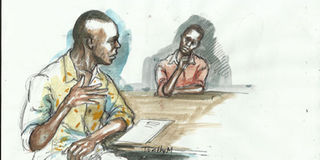Kiruhura District tragic murders: Torture most foul

What you need to know:
- I was used: The suspect denied participating in the murder and told the detective that he played no part in the aggravated robbery but confessed to having been forced to have sex with the farmer’s grand-daughter on the night in question.
- Horrific: According to Asiimwe, a dead body was brought and left in the room he slept in and warned that he would end up like the dead body if he did not cooperate.
A detective who was once attached to the special investigation division testified during the trial of the persons accused of the murder, in 2013, of a prominent cattle keeper in Kiruhura District and five of his workers.
The detective had recorded a Charge and Caution statement of one of the accused persons, a one Asiimwe James, who was detained at Kiruhura Police Station.
During the trial, the prosecution team applied to tender in the Charge and Caution statement of James Asiimwe as part of the evidence, but the defense team objected most vehemently. To the defence team, the statement was obtained by means of torture and coercion.
According to the accused person, prior to the statement being obtained from him, he had been beaten and subjected to physiological torture by being moved from one police station to another. He was taken to a police station in Kampala and then a safe house in Ntinda.
According to Asiimwe, a dead body was brought and left in the room he slept in with a warning that he toowould end up like that if he did not cooperate with the state. This was only the beginning of his torture.
The State promised to release him if he agreed to testify against his co-accused and offer him bail upon signing the statement. Court, in the circumstances, decided to conduct a trial within the trial to determine if indeed the statement was recorded voluntarily and out of the freewill of the accused person.
The detective who recorded the Charge and Caution statement told court that he got particulars of the charges from another colleague and the charges were of murder, defilement and aggravated robbery.
He told court that he was alone with the suspect and in civilian attire at the time when a statement was recorded and he had no weapon on him.
To the detective, the suspect appeared calm, had no health complaints and their interaction was cordial. The detective was seated behind a table and the suspect on the other side of the table.
The detective read all the charges to the accused and cautioned him as follows, ”You need not to say anything unless you wish to and whatever you say today will be put down in writing and will be used in evidence.”
The statement was written in Runyankore and read back to the suspect and he said he understood it and it was given to him to sign, which he did.
He was then asked if he had anything to say in relation to the allegations against him and that is when he said he had something to say.
The suspect on his own accord, and without coercion and intimidation, voluntarily narrated the story as he knew it to the detective.
The suspect denied participating in the murder and told the detective that he played no part in the aggravated robbery but confessed to having been forced to have sex with the farmer’s grand-daughter on the night in question.
He told investigators that he had sex with the girl in the field, but the girl in her evidence, told court and other people that she was defiled in the back of her grand-father’s car.
The story was written in Runyankole and read back to the suspect who then signed the statement on each and every page after which, the detective countersigned the pages. The detective denied making any promises to influence the suspect. The detective told court that he translated the statement into English. He denied playing any other role in the investigation of these offences.
The detective did not, however, ask the suspect how long he had been in detention and where and what had happened to him during the time he was in detention.
The reason the detective did not go into all these details was that his brief was only to record the Charge and Caution statement.
During cross-examination the detective admitted to a mix-up in the course of the translation.
The detective confessed that he knew of Operation Wembley, the Violent Crime Crack Unit, the Rapid Response Unit and the Flying Squad Units of the Police although he denied knowledge of the details of their modes of operation.
A medical officer examined James Asiimwe on September 13, 2013. The doctor stated in his report that he found out that Asiimwe was 26 years old, in a good general condition, a normal mental state and that there were no injuries anywhere on the body of the suspect.
He told court that he carried out a complete medical examination that involved history taking and a physical examination. He told court that he did not ask the suspect about his sleep patterns.
He, however, stated that he did not carry out other investigations such as X-ray investigations as there were no signs on the body of the suspect to warrant such examinations.
The doctor did not remember the suspect giving him a history of being beaten and of any scars on his body.
Under cross-examination, the doctor admitted that torture can lead to a mental breakdown and that a doctor may promote torture by omission or commission. An example given is when a doctor finds evidence of torture and does not document it.
TO BE CONTINUED




